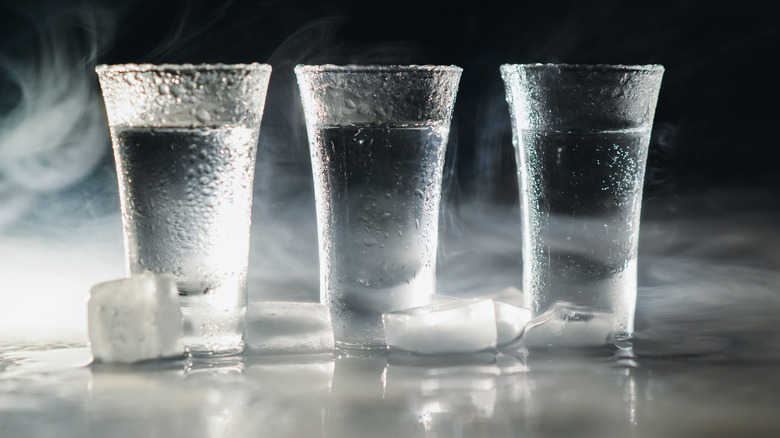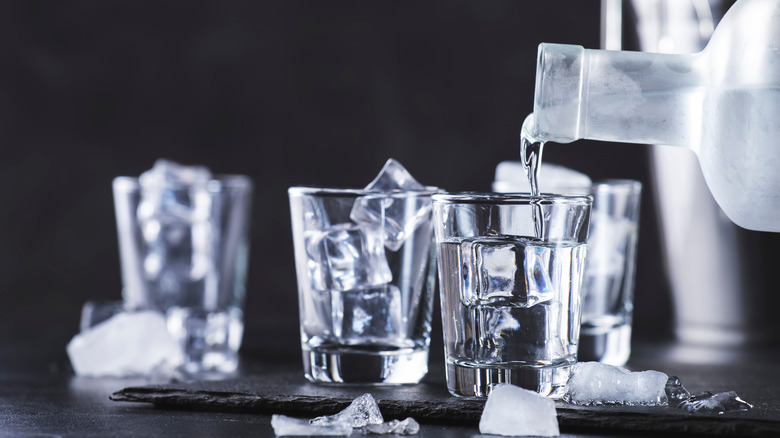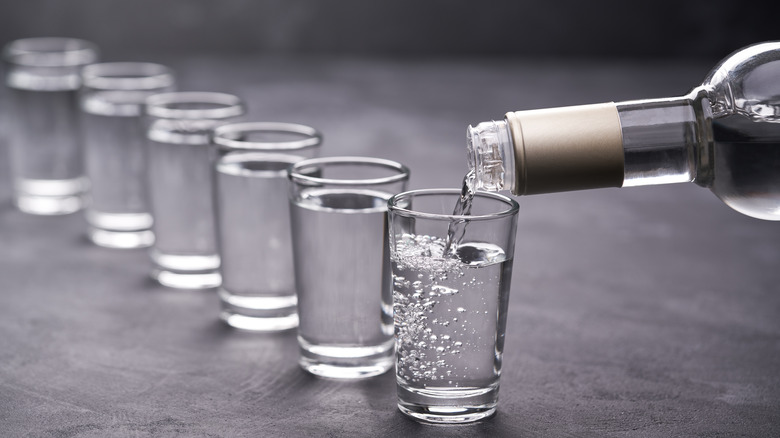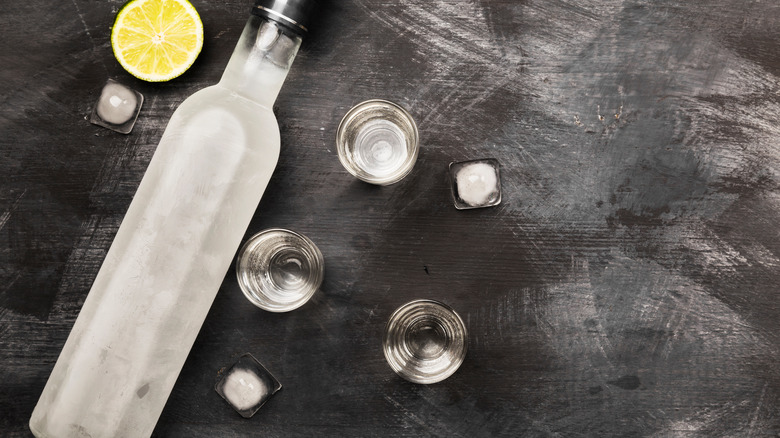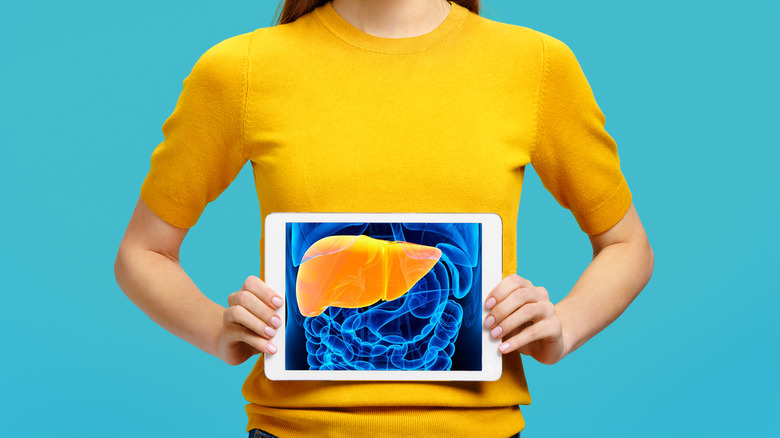What You're Doing To Your Body If You Drink Vodka Every Night
This may be an understatement, but a lot of people like vodka. Indeed, vodka has been a staple alcoholic drink for a very long time. Its name comes from "voda," the Russian word for water, and its roots stretch back to at least the 14th century (via Encyclopedia Britannica). And even in the 21st-century United States, the vodka market is positively booming. The spirit generated over 29.6 billion dollars in sales in 2019 (per Statista). And it's easy to see why.
As neutral-tasting, high-proof alcohol, vodka's a hugely versatile ingredient in various mixed drinks and cocktails, or as a drink on its own for those who like a simple, lower-calorie alcoholic drink. But with its high alcohol content comes the potential to drink a little too much. And if you're a fan of having a shot or two of vodka nightly, know they could be having some serious effects on your body. But what exactly are they? Join us as we take a look.
Drinking vodka every night could affect your immune system
High-proof alcohol like vodka might be useful to kill germs on your hands or your kitchen surfaces, but when it comes to your own body, imbibing vodka nightly could actually make you more susceptible to infection. "Alcohol has diverse adverse effects throughout the body, including on all cells of the immune system, that lead to increased risk of serious infections," Dr. E. Jennifer Edelman, a Yale Medicine addiction medicine specialist, told Healthline. When you drink alcohol, it becomes harder for your immune cells to fight off the pathogens which cause illness, meaning that you're more likely to be compromised and fall ill.
According to a summary published in Alcohol Research: Current Reviews, which detailed the relationship between alcohol and immune-related health effects, excess alcohol consumption was found to have an association with pneumonia as well as linked to various other pulmonary diseases. This is due to the cells in the upper airways being particularly affected by alcohol use, which can, as Dr. Alex Mroszczyk-McDonald, a family physician in Southern California pointed out to Healthline, also lead to increased risk of COVID-19 infection, if you're drinking in larger amounts.
Your gut health could take a hit
If you've ever woken up with an upset stomach after a night of throwing back a few too many vodka sodas, you're already well aware of some of the effects that alcohol can have on your gut. And if you were to drink vodka every night, you could experience a more profound impact on your gut health. As a review published in Alcohol Research: Current Reviews revealed, "Through multiple pathways, alcohol induces gut inflammation, which in turn promotes broad-spectrum pathologies both inside and outside the GI tract. In fact, many alcohol-related disorders, including cancers, liver disease, and neurological pathologies, may be exacerbated or directly affected by this alcohol-induced gut inflammation."
In short, excessive alcohol intake inflames the gut, massively impacting our health in the long term. The review also revealed that greater alcohol consumption also affects our microbiome, the system of healthy gut bacteria that helps maintain our immune system and proper digestion. This is in addition to the more immediate gastric discomforts that we can feel from drinking a little too much, like heartburn (via Medical News Today).
Your sleep may suffer
Fan of a nightcap? While countless people favor a drink at the end of a long day to help ease them into sleep, drinking vodka every night might not actually be as good for sleep health as we think. "While it's true that alcohol is a sedative, both having it in your system as well as the process of it wearing off can cause a variety of different problems," neurologist and sleep expert Dr. Jessica Vensel Rundo told the Cleveland Clinic. "You're likely to experience fragmented sleep, insomnia or possibly more serious sleep issues."
One of the reasons for this is the imbalance that alcohol can cause in our sleep cycles, as the National Sleep Foundation asserts. While the sedative effects of alcohol mean that we might get to sleep quicker, alcohol also suppresses our REM sleep stage (the stage in which we dream) earlier on in our night's sleep. This creates an imbalance between our REM sleep and slow-wave sleep stages, which means that we'll get shorter amounts of sleep throughout the night and may wake up more.
Drinking vodka isn't great for your oral health
You might love the taste of vodka, but you may not love the after-effects on your mouth. Drinking vodka each night could just damage your teeth. This is due to the low pH level of some vodkas. As Healthline pointed out, some vodkas have a pH level between 4 and 8, denoting a higher level of acidity which can eventually lead to a softening of tooth enamel and increased susceptibility to dental problems. Due to alcohol's drying and dehydrating effects, drinking vodka can also lower the levels of saliva in your mouth, which acts as further protection.
Furthermore, alcohol intake can affect your mouth health in even more profound ways. As a review published in the Alcohol medical journal revealed, the link between alcohol intake and an increased risk of oral cancer is long-established, with the authors writing, "Alcohol is strongly associated with the development of oral cancer and other upper aerodigestive tract cancers." As the review explained, this link is even more evident when combined with smoking.
Can vodka help with rheumatoid arthritis?
The symptoms of rheumatoid arthritis (or RA) can be tricky to manage. Interestingly, drinking alcohol like vodka may actually provide relief from symptoms of RA. According to a study co-authored by University of Sheffield-based rheumatologist James Maxwell, individuals with RA that drank at least 10 alcoholic drinks per month experienced 20 to 30% less inflammation and pain than those who didn't, perhaps due to an anti-inflammatory or analgesic effect (via WebMD).
While this might be music to the ears of many, it may not be as cut and dry as that. The results of the study were challenged by fellow rheumatologist Dr. Nortin M. Hadler, professor of medicine at the University of North Carolina School of Medicine, who called it "very weak science." Hadler pointed towards the fact that "'moderate' level of imbibition is associated with higher socioeconomic status, which itself bodes well for mortality and for rheumatoid arthritis prognosis." As such, more research is needed and caution should be taken before turning to alcohol to ease symptoms directly.
You'll likely become dehydrated
If you've ever woken up completely parched after a night on the town, you know how drinking alcohol can leave you thirstier than before. Drinking vodka every night could certainly add to this, due to its dehydrating effect. "Alcohol is a diuretic, which means it causes you to urinate more by inhibiting you from reabsorbing water, thus increasing your risk of dehydration," Dr. Michael Richardson, a physician at One Medical, told Bustle. "The higher the alcohol content a drink has (or is absorbed in your body), the greater the diuretic and dehydration effect."
With the average vodka coming in at 80 proof, or 40% ABV, in the U.S., it certainly has a higher alcohol content than other clear spirits, like gin and rum. If you've taken to having a vodka martini every night, you're increasing your potential for dehydration. It's useful to remember, though, that the alcohol content of a drink will be lessened by mixing it with a non-alcoholic beverage. A vodka mixed with club soda, for example, will dehydrate you less than a straight shot.
Drinking a little bit of vodka could be good for your heart health
When it comes to the link between alcohol and heart health, one drink stands tall above the rest: red wine. It has long been thought of as heart-healthy, as WebMD explained. However, vodka and other types of alcohol may provide their own benefits for your heart health, particularly in lower quantities.
A 2020 review published in Nutrients examined a decade of scientific literature and studies, found that "light-to-moderate alcohol intake ... could be protective for hypertension [high blood pressure]." The study also recognized a link between low alcohol intake and increased levels of "good" cholesterol, or HDL.
The study, however, was quick to point toward the fact that higher levels of alcohol intake can be "deleterious" for good health. And drinking alcohol may not be the best recourse for a healthier heart in the first place. As cardiologist Dr. Leslie Cho told the Cleveland Clinic, "It's better not to drink any alcohol at all" instead of actively drinking alcohol in the hopes of improving your heart health.
Your skin will pay the price
A nightly vodka could have effects on your skin that you'd rather not see. "Alcohol dilates the pores of the skin, leading to blackheads and whiteheads," Dr. Amy Spizuoco of Greenwich Village Dermatology in New York City told GQ magazine. "And if is not properly treated, it can go on to cause inflamed skin papules (lesion-like bumps) and cystic acne."
What's more, due to the alcohol in vodka acting as a diuretic, it can end up dehydrating the cells in your body, leading to inevitable dehydration of the skin cells. "This decreases normal cellular turnover and leads to an unhealthy, dull complexion," said Spizuoco. Adding a mixer to dilute the alcohol content, or drinking water while drinking alcohol can help, according to the expert. "This can minimize harmful effects of alcohol on the skin by hydrating the tissues and skin," she continued. Dermatologists also advise using gentle cleansers rather than soap and avoiding skincare products that contain alcohol to maintain good skin health (via Byrdie).
Should you drink vodka to ease your stress?
There's a reason why so many people turn to a nightly tipple at the end of a long working day. Drinking alcohol could be useful in lowering stress levels, and when it comes to vodka it could be even more effective than other drinks. A study published in the Journal of Psychopharmacology looked directly at the stress-reducing effects of vodka and another calming favorite, red wine, and found that vodka had a "clear effect in reducing stress," whereas "red wine did not." This could be, as the study's authors suggested, due to red wine having "psychoactive properties independent of its alcohol effects."
It's vital to remember, however, that specifically drinking vodka (or any kind of alcohol) to relax can quickly become problematic. "If you rely on alcohol for happiness and pleasure, even numbing the stress, then that can actually cause significant problems down the road," Denise Graham, a counselor at Cleveland Clinic's Alcohol and Drug Recovery Center (ADRC), told the Cleveland Clinic. "You're not learning how to cope with things as they are right now. You're not learning to cope in healthy ways."
If you or anyone you know is struggling with addiction issues, help is available. Visit the Substance Abuse and Mental Health Services Administration website or contact SAMHSA's National Helpline at 1-800-662-HELP (4357).
You can thank vodka for your sore head
This one might not be a shock to anyone who's felt the effects of a boozy night, but drinking vodka on the regular? Not the best way to avoid a hangover!
It's interesting to note, though, exactly how a hangover is caused, which isn't just a result of dehydration. "The major issue with drinking alcohol to excess is that the alcohol goes to your liver before all other parts of the body," Dr. Tarek Hassanein, a hepatologist and director of Southern California Liver Centers, told Eat This, Not That. "The alcohol gets metabolized in the liver and breaks down into toxic compounds which are then distributed throughout the body. When these toxic compounds are high in the blood, we get these symptoms of a hangover."
Dehydration, however, does worsen a hangover, leading to that pesky headache. "Dehydration causes the brain to swell, and this is the headache you are feeling," confirmed Hassanein. Hangovers are also made even more vicious by the electrolyte imbalance they can cause in your body. The solution? Good nutrition, plenty of water, and sleep. Oh, and definitely try to stick to one or two drinks, as per the CDC guidelines.
Drinking vodka every night could lead to varying types of liver disease
Over 4.5 million American adults have been diagnosed with liver disease, according to the CDC. High levels of alcohol intake can have a direct effect on the health of your liver. Fatty liver, or early-stage liver disease, is caused by a build-up of fatty cells in your liver caused by regular alcohol intake (via Patient). This can progress to mild or severe alcoholic hepatitis and, eventually, alcoholic cirrhosis, a buildup of scar tissue on the liver which is usually permanent and can lead to severe health complications.
Hepatologist Christina Lindenmeyer said abstinence from alcohol is the best treatment for your liver, as well as for improving an already damaged organ. "We do know that the longer people are abstinent from alcohol, the better their livers get, even up to a year after stopping alcohol," Lindenmeyer confirmed to the Cleveland Clinic. "It may not improve to be a completely normal liver, but it can improve to the point where they may not have complications related to their liver disease."
You risk developing a dependence
With drinking vodka or other types of alcohol each night comes the potential for the development of alcohol dependence, often stemming from alcohol abuse (or alcohol use disorder). According to the National Institute on Alcohol Abuse and Alcoholism, alcohol abuse can be defined as continuing to drink even in the face of personal or interpersonal, health, social or legal concerns that stem from alcohol use.
Alcohol dependence is perceived to be an escalation of this behavior. The Institute defined it as a recognition of higher tolerance of alcohol, difficulties in abstaining or cutting down alcohol intake, experiencing withdrawal symptoms when not drinking alcohol, and prioritizing alcohol use over other important or pleasurable activities. If you recognize any signs of alcohol abuse or dependence within yourself, it would be useful to speak with a healthcare professional, as Verywell Mind advised. More severe cases of alcohol use disorder or alcohol dependence may require medical intervention or outside help to treat them effectively.
If you or anyone you know is struggling with addiction issues, help is available. Visit the Substance Abuse and Mental Health Services Administration website or contact SAMHSA's National Helpline at 1-800-662-HELP (4357).
Drinking vodka over beer could reduce your calorie intake
Due to its higher carbohydrate content, beer can be surprisingly high in calories (via Healthline). Switching to vodka can lower your calorie intake, as it's made up primarily of alcohol and water, meaning you'll ingesting fewer additional calories with each drink. According to registered dietitian Christy Brissette, owner of 80 Twenty Nutrition, the calorie factor of alcoholic drinks could be something to keep an eye on. "Calories from alcohol can add up fast. And, because alcohol doesn't provide nutrients or fill you up, these calories are usually in addition to what you're already eating and drinking," she told Health.
Some other alcoholic drinks, such as dessert wine or cocktails or other sugary beverages, can also be higher in calories per serving than spirits like vodka, as Medline Plus demonstrated. While spirits like gin or whiskey are pretty much equivalent to vodka in calorie content, rum, which often contains more sugar, can be more calorific per serving. Not all alcohols are created equal — and if you're having a beverage regularly, it could be worth examining what's in it.
Drinking vodka every night could affect your bone health
A nightly shot (or more) of vodka might be affecting you where you can't see it: your skeleton. According to a study published by the National Institute on Alcohol Abuse and Alcoholism, regular high alcohol intake can have negative effects on bone health. The study's authors wrote that "human and animal studies clearly demonstrate that chronic, heavy alcohol consumption compromises bone health and increases the risk of osteoporosis. In particular, heavy alcohol use decreases bone density and weakens bones' mechanical properties. These effects are particularly striking in young people (and animals), but chronic alcohol use in adulthood can also harm bone health."
Furthermore, your bones may not necessarily be able to bounce back from early damage linked to alcohol intake, with the authors writing, "Animal studies suggest that bones do not overcome the damaging effects of early chronic alcohol exposure, even when alcohol use is discontinued." While there has been some evidence that moderate alcohol intake can help bone health, the study dubs this as "tenuous." If you're looking to maintain your bone health, a nightly vodka cocktail might not be the most fool-proof way to go about it.

